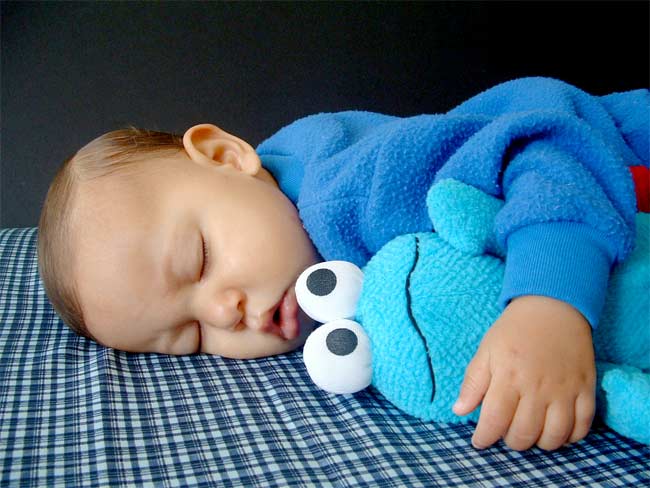How Parents Can Get Infants to Sleep, Once and For All

For parents having trouble getting their infants to sleep, a new study suggests being emotionally available to baby's needs is key to a good night sleep. The study suggests it's not so important how much time parents spend with children or what they do at bedtime, but rather the quality of that time.
The findings may be important for both sleep-deprived parents and their kids. Chronic sleep troubles in childhood are linked with daytime behavioral problems, sleepiness and attention problems, and poor academic performance, the researchers say.
Emotional quality
Being emotionally receptive would include things like gazing at your infant while breastfeeding, or noticing if your child is not interested in a book, and so putting the book down. Some sleep experts have advised parents set a strict sleep schedule and keep certain routines that become associated with going to sleep, such as reading a book and dimming the lights.
When parents provide reassurance through emotional communication, the researchers believe that it lets children know they are in a safe environment. They argue that feeling safe is ultimately a prerequisite for achieving deep sleep.
"Bed time can be a very emotional time. It heralds the longest separation of the day for most infants," said study researcher Douglas Teti, professor of human development and family studies at Penn State. "It struck me that going to sleep, and sleeping well, is much easier for some young children than others, and I wanted to assess what factored into this, and what parents and children contribute to sleep patterns."
Sleep like a baby
Sign up for the Live Science daily newsletter now
Get the world’s most fascinating discoveries delivered straight to your inbox.
This study involved 35 families with infants 24 months of age and younger, and is the first to use multiple video cameras in the infants' and parents' bedrooms to capture parent-infant interactions at night. Fathers were also included, but since only seven of them interacted with their infants for a long enough time (at least two to three minutes) during bedtime, the researchers focused on maternal bedtime behavior only.
Infants whose moms were more emotionally available during bedtime showed fewer disruptions when settling to sleep and less sleep disruption overall compared with infants whose moms were less emotionally available.
Mothers rated as more emotionally available were less likely to have to return to their infants at bedtime and less likely to report their infants had sleep difficulties. These emotional moms also tended to have infants who didn't wake up as much throughout the night as other infants in the study.
For instance, one emotionally available mother responded to her 6-month-old infant's vocalizations during breastfeeding. "She continuously gazed at the infant's face and, whenever the infant vocalized, she responded promptly (e.g., 'It's OK.')," the researchers write in a recent issue of the Journal of Family Psychology.
"Mothers who were more emotionally connected to their infants during breastfeeding had infants who settled to sleep quicker and were more likely to 'sleep through the night' than infants whose mothers were not as emotionally connected," Teti said.
Another mother "used stern directives with her 24-month-old during book-reading whenever the child got up out of bed," and "continually attempted to engage the child in the book despite clear signs that the child was losing interest (e.g., child was fidgety and continually turned his attention elsewhere)," the researchers noted. The result: "The child got up and left the room four times before he eventually fell asleep."
How you do it
The results showed that what mothers do with their infants at bedtime, say whether they have close physical contact, may be less important to the infant's sleep success than the emotional quality that underlies these activities. This contradicts past research, which had suggested prolonged close physical contact with a parent undermines babies' ability to sleep on their own.
"Quality of parenting appeared to be more important than what parents did, or how long they did it," Teti told LiveScience.
Teti said he is finding similar results in a more in-depth analysis of factors promoting infant sleep as they age from 1 month to 2 years. One of the next steps will be to examine links between infants' temperamental styles, parenting at bedtime and during the night, and sleep disruptions, Teti said.
- 10 Spooky Sleep Disorders
- 5 Things You Must Know About Sleep
- 10 Things You Didn't Know About You
Jeanna Bryner is managing editor of Scientific American. Previously she was editor in chief of Live Science and, prior to that, an editor at Scholastic's Science World magazine. Bryner has an English degree from Salisbury University, a master's degree in biogeochemistry and environmental sciences from the University of Maryland and a graduate science journalism degree from New York University. She has worked as a biologist in Florida, where she monitored wetlands and did field surveys for endangered species, including the gorgeous Florida Scrub Jay. She also received an ocean sciences journalism fellowship from the Woods Hole Oceanographic Institution. She is a firm believer that science is for everyone and that just about everything can be viewed through the lens of science.









